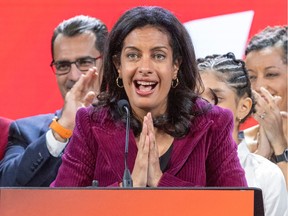The last time an official opposition party fell so quickly in the popular vote was in 1919.

.
In the wake of what was both a victory and a defeat of historic proportions for the Quebec Liberal Party on Monday night, the question for the once-dominant force in provincial politics is how or if the party can regain control. support you ever had.
Announcement 2
.
Saved by their stronghold of Anglophone and Allophone supporters mainly in West Montreal and in some areas near the island, the Liberals won 21 seats, enough to maintain their official opposition status.
.
It did so despite only getting 14.37 percent of the overall vote, compared to 40.98 percent for François Legault’s victorious Coalition Avenir Québec, and less than Québec solidaire (15.43 percent). and the Parti Québécois (14.60 percent).
In 2018, when the Liberals were soundly defeated by the CAQ, the party still won 25 percent of the popular vote under Philippe Couillard.
The last time an official opposition party fell so quickly in the popular vote was in 1919, when francophone voters rioted in anger over the Conservative Party’s support for conscription, explained André Lamoureux, a political science professor at the Université du Quebec to Montreal.
Announcement 3
.
“And even then, the Conservatives got 17 percent of the vote,” Lamoureux said. “And yet (Dominique Anglade), with 14 percent support, is still the leader of the opposition. He is almost surreal”.
Lamoureux likens the fall of the Liberals to the lack of a “nationalist touch” in the party. Polls indicated that only seven percent of Francophone voters intended to support the Liberals in these elections.
“It is a very multiculturalist party, which defends diversity and even the conciliation of religious integration, but it does not respond well to the nationalist will of Quebecers,” Lamoureux said.
Historically, liberal leaders like Robert Bourassa could be federalists while also mounting a strong defense of Quebec on issues like language or provincial jurisdiction, Lamoureux said. Despite his federalist background, Bourassa won 53 percent of the vote in the 1973 election, largely because of his willingness to fight Prime Minister Pierre Trudeau in Ottawa.
Announcement 4
.
The Liberal Party is even more paralyzed by the fracture of its traditional vote. In the D’Arcy-McGee walk, for example, which includes Côte-Saint-Luc, Hampstead and part of Côte-des-Neiges—Notre-Dame-de-Grâce, the percentage of voters who opted for the Liberals fell from 74 percent in 2018 to 51 percent in this election. Quebec’s Conservative Party won 22 percent of the vote in D’Arcy-McGee, down from 4.5 percent in 2018. In Westmount’s leadership, support for the Liberals fell from 66 percent in 2018 to 50 percent on Monday. , and Notre-Dame-de-Grâce saw a similar drop, from 63 percent to 50 percent.
The fall in support for the Liberals began long before Dominique Anglade became leader, said Daniel Béland, director of the McGill Institute for the Study of Canada.
ad 5
.
“I would say it’s the legacy of the Couillard years,” he said. “Couillard was the least nationalistic leader since Adélard Godbout in the years of World War II. … Couillard was really anemic in terms of it, he just didn’t believe in it.
“I think it’s hard for Francophones to vote for a party with a leader who isn’t really nationalist because they want someone to defend the province in Ottawa. And that is something that the CAQ understands very well.”
Legault has proven very effective at connecting with a large constituency by “channeling some concerns” strategically, Mireille Paquet, an associate professor of political science at Concordia University, said in an interview with CBC News on Tuesday. “Sometimes it’s about immigration or the survival of the French language, sometimes it’s about the economy and sometimes it’s about presenting yourself as the only mature leader and the only person who can really manage Quebec.”
ad 6
.
The CAQ is also “one of the last examples of a true majority party that is primarily concerned with adapting to the demands of voters in order to win,” Paquet said. At the same time, the last election has shown that you don’t have to win over Montreal voters to win a majority.
Before the election, Anglade toured the regions and tried to promote an image of the Liberal Party as more nationalist. But his clumsy handling of Bill 96, the CWC government’s language legislation, alienated his core Anglophone and allophone voters, forcing Anglade to back down.
Anglade has admitted the party is in the midst of a long rebuilding phase, one which he says they will get through by “staying true to liberal values, rather than changing policy every time the wind turns”.
Béland predicts that it will be a long process.
“Liberals will have to come to terms with Quebec nationalism while maintaining their traditional support among Anglophones,” Béland said. “And it’s hard to repair these two relationships at the same time.
“They could be crossing the desert for a while.”
-
What battle for Quebec? This election could make the CAQ even stronger
-
Anglade declares victory for unity in Quebec as Liberals maintain opposition status



